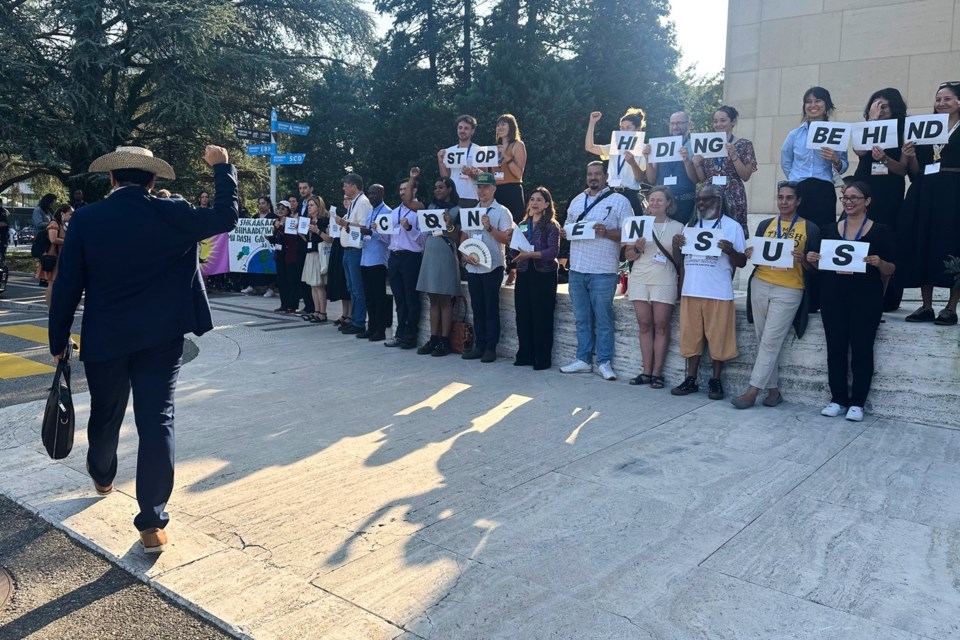GENEVA (AP) — Environmentalists and Indigenous leaders held signs Tuesday in front of the United Nations buildings in Geneva, where talks for a global accord to end plastic pollution are taking place, asking nations to show courage and agree to a strong treaty.
Most were from organizations that are part of the Break Free From Plastic movement. They said they wanted their voices to be heard as the talks wind down in Switzerland. Nations are crafting the first global, legally binding treaty on plastics pollution.
“We’ve invested a lot into coming all the way to Geneva, away from our communities, away from our families, because we understand how important an issue this is and how crucial a moment this is,” said Juressa Lee, who is from New Zealand and was representing the Aotearoa Plastic Pollution Alliance. “It’s a once-in-a-lifetime plastics treaty.”
They urged delegates to vote on the treaty if consensus can’t be reached and the process becomes paralyzed. Every nation must agree for any proposal to be included in the treaty.
The talks are scheduled to conclude Thursday.
“To date the process has been broken," said Brett Nadrich, spokesperson from Break Free From Plastic. "Civil society leaders from around the world, together with those most impacted, are speaking with a unified voice that we need to show courage, not compromise, and fix the process.”
The head of Panama’s delegation to the talks, Juan Carlos Monterrey Gomez, cheered them on as he walked by.
“We need that all over the world,” he told The Associated Press. “We need people outside of here to tell their countries to speak up for what it is that they’re standing for. Are they standing for them, their citizens, or big oil?”
The biggest issue is whether the treaty should impose caps on producing new plastic or focus instead on things like better design, recycling and reuse. Panama is helping to lead an effort to include plastic production in the treaty.
“We’re going to be pushing until the end,” Monterrey Gomez said. “Because if there is no production, there’s no treaty.”
Magnus Heunicke, the Danish environment minister, and Jessika Roswall, the European commissioner for the environment, held a news conference to stress the European Union is in Geneva to get a legally binding, international agreement on how plastic is produced, consumed and disposed. Denmark holds the rotating presidency of the Council of Europe.
“We are here to make a deal, our aim is to make it as ambitious as possible,” Heunicke said. “If it was only up to the EU, then we all know how high ambitious it would be. It is not, however, up to the EU.”
Heunicke didn’t specify what they would do if plastic production isn’t in the treaty, since the negotiations are ongoing. Roswall said the EU is ready to deal, though not at any cost, and in any negotiation all parties always have the option to walk away.
Most plastic is made from fossil fuels. Powerful oil-producing nations are strongly opposed to including plastic production in the treaty. So is the plastics industry.
“The negotiators need to focus on ending plastic pollution in the environment,” said Chris Jahn, president and CEO of the American Chemistry Council. “If they do that, there is a landing zone and a deal is possible. If we try to address every single issue that every single country has, they will not reach a deal here.”
Momentum has been growing for a proposal led by Mexico and Switzerland for an article to address problematic plastic products, including single-use plastics, and chemicals.
Camila Zepeda, who is leading negotiations on that article for Mexico, said there is an understanding there are harmful additives contained in plastics and some plastics not essential for everyday life that could be managed and eventually phased out.
Tuesday's sessions are “very intense” as negotiators work against the clock, Zepeda said.
“It's slow progress,” she said. “But hopefully we still manage to get an agreement. I do see an appetite to finish and to get an outcome here at Geneva.”
___
The Associated Press’ climate and environmental coverage receives financial support from multiple private foundations. AP is solely responsible for all content. Find AP’s standards for working with philanthropies, a list of supporters and funded coverage areas at AP.org.
Jennifer Mcdermott, The Associated Press



